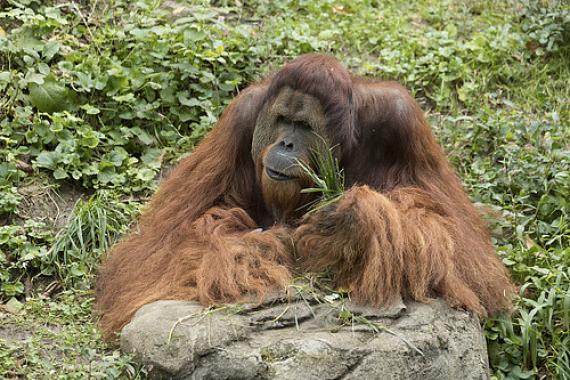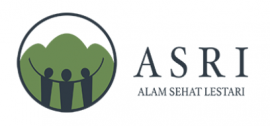Alam Sehat Lestari
Current initiative
Published

Adult male orangutan (Photo "Animals" by US Department of State is licensed under CC PDM 1.0)
Alam Sehat Lestari (ASRI) is a local NGO working around the Gunung Palung National Park (GPNP) in West Kalimantan, Indonesia. The main focus of ASRI is to implement health and conservation-orientated community development programs in order to reduce illegal logging in GPNP. Communities were cutting timber in the park due to limited access to health services partnered with the lack of alternative livelihoods. As a result, in 2007 ASRI opened their first clinic to provide affordable and quality health services to all members of the community. Additionally, in 2009 ASRI implemented a reforestation program, providing jobs to local community members to plant trees within GPNP with the aim of decreasing incidents of illegal logging through employment. In 2013 a survey found that 80% of respondents believed the reforestation program had helped to reduce illegal logging in GPNP.
The poaching and wildlife trade problem
Species affected Bornean Orangutan Pongo pygmaeus , Timber Species
Overview of the problem
GPNP has been persistently threatened by illegal logging for the past several decades. Between 1988 and 2002, up to 38% of the lowlands and 70% of the buffer zone of the park was deforested by timber concessions. Concessions usually operated legally within buffer zones but later expanded illegally beyond concession boundaries into protected areas. Between 1992 and 2004 it is estimated that 13% of the park’s designated area was deforested. Although most of the timber concessions have since expired, population growth combined with increases in palm oil demand has continued to pressure GPNP and community-based logging has also been a major problem. For example, by the late 1990s, approximately 80% of households around GPNP obtained more than half their cash income from logging, although surveys by ASRI found that this had declined to 33% by 2008 and 10% by 2012.
The anti-IWT initiative
ASRI carries out the following activities in order to decrease illegal logging and provide better access to health care and alternative livelihoods for the communities surrounding GPNP.
Alternative livelihoods
- The Sustainable Agriculture program aims to increase agricultural business through farming.
- The Family Garden program aims to increase the capacity and knowledge of housewives in farming practices on their own land. The program builds and increases the productivity of family gardens and is integrated into the management of family finances.
- In 2016 ASRI began an entrepreneurship program that aims to explore potential business opportunities as permanent livelihood solutions for loggers. Communication is established with loggers and their capacity increased through entrepreneurship training and financial management training. The program uses the Chainsaw Buyback scheme where loggers are given capital through selling their saws which they can exchange for business assistance including business management and household finance.
- Goats for widows aims to increase widow income by providing an alternative livelihood option in goat farming.
Health services
- The ASRI Health Clinic was established in 2007.
- A mobile clinic has served around 1,700 patients from various hamlets around GPNP.
Reforestation
The purpose of the ASRI reforestation land on Laman Satong is to rehabilitate burnt land and to prevent fires at the Laman satong reforestation site.
There is also an area of ASRI reforestation in Begasing, which aims to care for and monitor the development of the ecosystem and prevent fires at the reforestation site.
In addition is the Garden to Forest reforestation program. ASRI and the people who own garden land around GPNP are committed to helping each other to preserve nature in GPNP.
Deforestation monitoring
- Forest Friends was formed in 2010 to involve local community members in conservation programs, such as monitoring reforestation activity, as well as destructive activities such as illegal logging. ASRI uses this information to set discounts at clinics as an incentive for people who support reforestation efforts. Currently, ASRI is partnered with 30 villages around GPNP with at least one Forest Friend representative in each
- ASRI also monitors community activities that cause environmental damage.
Community outreach program
- Communities are given education materials describing ASRI activities and how they can benefit from health services and community conservation programs.
- Health education sessions are held at the clinic.
- The Kids-Teens program teaches younger generations about health and the environment.
The strategy
Increasing incentives for wildlife stewardship
Increasing livelihoods that are not related to wildlife
Improving education and awareness
Has the initiative made a difference?
Since reforestation activities began in 2009, over 200 hectares have been reforested with over 200,000 trees planted. The program has received widespread support from local community members and there have been no community conflicts over land tenure. Additionally, a survey in 2013 revealed that 80% of respondents agreed that the presence of the reforestation program had reduced incidents of illegal logging in GPNP. The survey showed that involvement in reforestation activities was correlated with perceptions in the decline of illegal logging. Over 68% of respondents have also started to engage in self-initiated tree planting activities.
The survey also showed that many respondents expressed increases in personal confidence and professionalism due to skills gained in various community programs. Overall, 1,200 loggers have changed their livelihoods with many reporting that they now view the forest differently as a result and an 89% decrease in the number of illegal loggers
Overall, there were positive responses about ASRI activities and a new sense of empowerment among the villages adjacent to GPNP.
The health clinic has been a particular success. By the end of 2019 ASRI Clinic had received nearly 95,000 visits from over 30,000 patients, with a 67% decrease in the number of infant mortalities. A mobile medicine program also helps to reach the most remote villages.
Organisers, donors and partners
For further information contact (peoplenotpoaching@gmail.com).
